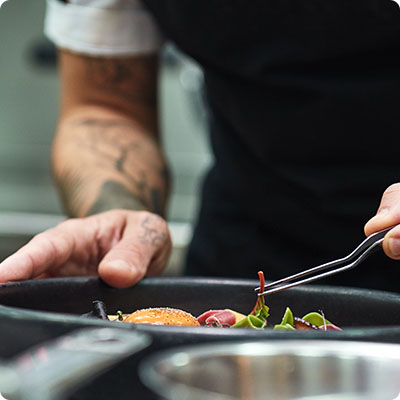In the heart of the spice island
Ingredients drawn from Bantu culture include various bean species as well as yams, plantains and okra, a green vegetable whose viscous juice is highly prized for thickening sauces. Later, from the 9th century onwards, Omani, Yemeni and Persian traders brought spices, coconuts, mangoes, citrus fruits and rice from Asia to the entire Swahili coast. In the 15th and 16th centuries, the Portuguese colonial presence in the Indian Ocean led to the introduction of various products from the Americas, such as corn, sweet potatoes, manioc and pineapple. At the end of the 17th century, the region came under the control of the Sultanate of Oman, which strengthened relations between the Swahili coast and India, making Zanzibar a hub for the spice trade. The massive arrival of Indian merchants had a major influence on local gastronomy. German and English colonization, on the other hand, had little influence. The presence of Chinese workers in the region, although localized, introduced products such as soy sauce.
The archipelago's island location makes it an ideal place for fish and seafood. The large fish market in Stone Town is a good example: tuna, mackerel, lobster, octopus, squid and more. But meat is also eaten here, including chicken, beef and lamb. But of course, the archipelago doesn't have such a charming nickname without reason. The region's tropical climate is perfectly suited to the cultivation of spices such as pepper, cinnamon, ginger, nutmeg, ginger and cumin. And of course cloves, of which the island controls 90% of national production, making Tanzania the world's third largest producer.
With an almost entirely Muslim population, alcohol and pork are considered "haram" here, i.e. "impure". Tourists, however, are not affected by Islamic dietary prohibitions. The same applies to Ramadan, and large international hotels and lodges serve food during the day. But this is not necessarily the case if you decide to eat locally, especially on a trip to Zanzibar's old town, where many stalls are closed until sunset, when it is permitted to break the fast.
The classics of Zanzibarite cuisine
The archipelago's cuisine has been strongly influenced by a long-standing Arab and, above all, Indian presence, and curries, biryani, samoussas and chutneys are very common. One of Zanzibar's flagship dishes, for example, is pilaf or pilau, a stewed rice with onions, coconut milk, mild spices (cinnamon, nutmeg, cloves) and sometimes dried fruit and meat. Another Indo-Portuguese recipe, sorpotel, comes from Goa, and consists of beef - meat and offal - simmered with masala (a spice blend), tamarind pulp and vinegar.
A dish of Arabic origin, boko boko is the Zanzibarite version of harees, a Middle Eastern dish often served during Ramadan. It consists of durum wheat simmered for a very long time with meat (beef, chicken, mutton) until it melts like porridge. Or try mchuzi wa pweza or pweza wa nazi, an octopus curry with coconut milk.
There's a wide variety of street food, such asurojo, a spicy broth with mango, potatoes, grilled meat, raw vegetables (tomato, onion, lettuce, cucumber, etc.) and fried onion croquettes with a spicy sauce. Or katlesi, fried croquettes made with fish, vegetables, beef or hard-boiled egg.
Unless you prefer a Zanzibar pizza, which is a pizza in name only, more like a patty fried on a griddle before being topped with a mixture of minced meat, tomato, onion, spices and cheese. Also discover sesame buns - similar to naans - which here are called mkate wa ufuta. Finally, mishkaki are finely spiced beef skewers similar to a shish kebab.
Desserts, coffee and drinks
Local desserts are as simple as the island's cuisine. These include mandrazis, classic sugar doughnuts. But there's also spice cake, which - as the name suggests - comes in a gingerbread flavor with cinnamon, cloves, nutmeg and a hint of chocolate. Date & hazelnut bread is often served to celebrate the end of Ramadan. The archipelago's tropical climate also allows for the cultivation of tasty fruits such as mangoes and coconuts, often prepared as chutneys, but also papayas, bananas, pineapples and a host of citrus fruits, as well as the famous water apple or jambose, a fruit that is botanically close to a guava and is savoured for its crunchy, juicy, slightly sweet flesh with a slight apple flavour.
Zanzibar kahawa is a traditional local spiced coffee sold in the streets of the city, notably at the Forodhani market, which can be drunk day or night. It is prepared with fresh cinnamon and cardamom, hot water and coffee roasted and ground in cups, powerful in aroma and concentrated in flavor. The first cup in the morning is an opportunity to exchange cheerful greetings and wish your neighbors an "Allah willing", a good day. In Stone Town, the old-timers' favorite place to drink it every morning is Jaw's Corner, in the Soko Muhogo district. This coffee is said to be excellent for the stomach, thanks to the antiseptic effect of cinnamon, and locals say it is very effective in preventing indigestion or tourista.
Finally, Tanzanian beers are highly reputed, and the country is one of the biggest consumers on the African continent. And while Muslim Zanzibarites don't drink alcohol, Tanzanian mainlanders do and even produce local beers, which you'll find in every bar and hotel on Zanzibar. These malt beers are produced in the breweries of Arusha, Moshi or Dar. You'll find Safari Lager, Serengeti, Castle, Ndovu, Kilimanjaro...

















